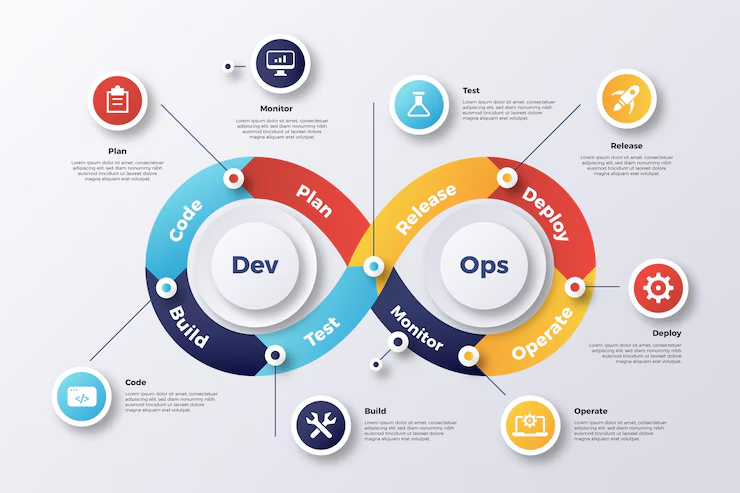DevOps has emerged as a critical methodology for modern software development, transforming how organizations build, test, and deploy applications. This approach emphasizes collaboration between development and operations teams, fostering a culture of automation, continuous integration, and continuous delivery.
Page Contents
Key Principles of DevOps
Key principles like Continuous Integration and Continuous Delivery (CI/CD) empower teams to automate repetitive tasks, identify and address issues early in the development lifecycle, and deliver software updates more frequently and with greater confidence. This iterative approach fosters a culture of experimentation and learning, allowing organizations to adapt quickly to changing market demands and customer needs. Companies specializing in it infrastructure services london can leverage these DevOps principles to enhance their service delivery, improve operational efficiency, and gain a competitive edge in the market.

- Continuous Integration (CI): Developers frequently integrate code changes into a shared repository. Automated builds and tests are triggered to ensure code quality and identify issues early in the development lifecycle, minimizing the risk of integration problems and reducing the time spent on debugging.
- Continuous Delivery (CD): Automated deployment pipelines deliver software changes to production environments rapidly and reliably. This minimizes manual intervention, reduces the risk of human error, and enables faster time-to-market for new features and updates.
- Infrastructure as Code (IaC): By treating infrastructure as code, organizations can automate the provisioning, configuration, and management of servers, networks, and other infrastructure components. This approach enhances consistency, reduces manual errors, and improves scalability.
- Microservices Architecture: Breaking down applications into smaller, independent services enhances scalability, flexibility, and maintainability. This modular approach allows teams to develop, deploy, and scale individual services independently, improving overall system resilience and enabling faster innovation.
- DevOps Culture: Fostering a collaborative culture between development and operations teams is crucial for successful DevOps implementation. This involves breaking down silos, promoting open communication, and encouraging shared responsibility for the entire software delivery lifecycle.
By embracing these key principles, organizations can leverage DevOps to achieve faster time-to-market, improved software quality, enhanced operational efficiency, and increased business agility.
Benefits of DevOps
DevOps has revolutionized the software development landscape, fostering a collaborative and agile approach that prioritizes speed, quality, and continuous improvement. By breaking down silos between development and operations teams, DevOps enables organizations to deliver software faster, more frequently, and with greater reliability. This translates to increased customer satisfaction, a competitive edge in the market, and improved business agility.
- Faster Time to Market: By automating processes and streamlining workflows, DevOps accelerates software delivery. This translates to faster time-to-market for new features, products, and services, giving businesses a competitive edge.
- Improved Quality: Automated testing and continuous integration help identify and fix bugs early, resulting in higher-quality software. This reduces the risk of releasing software with critical defects, improving customer satisfaction and reducing support costs.
- Increased Reliability: DevOps practices promote stability and reliability through automated deployments and monitoring. This ensures that applications are always available and perform as expected, minimizing downtime and improving user experience.
- Enhanced Collaboration: Improved communication and collaboration between development and operations teams lead to better outcomes. By breaking down silos and fostering a shared understanding, DevOps teams can work more efficiently and effectively.
- Greater Flexibility: DevOps enables rapid response to changing business needs and market demands. This agility allows businesses to quickly adapt to new opportunities, address emerging threats, and stay ahead of the competition.
By embracing these benefits, organizations can leverage DevOps to significantly improve software delivery, customer satisfaction, and overall business success.
Essential DevOps Tools
Essential DevOps tools are the backbone of any successful DevOps implementation. These tools automate various stages of the software development lifecycle, from code versioning and continuous integration to infrastructure provisioning and monitoring. Key examples include version control systems like Git, CI/CD tools like Jenkins and CircleCI, containerization platforms like Docker and Kubernetes, configuration management tools like Ansible and Puppet, and cloud platforms like AWS, Azure, and Google Cloud. By leveraging these tools effectively, DevOps teams can streamline workflows, improve efficiency, and deliver high-quality software faster and more reliably.
- Version Control Systems: Git, SVN
- Continuous Integration/Continuous Delivery (CI/CD) Tools: Jenkins, CircleCI, GitLab CI/CD
- Configuration Management Tools: Ansible, Puppet, Chef
- Containerization Tools: Docker, Kubernetes
- Cloud Platforms: AWS, Azure, Google Cloud Platform
- Monitoring and Logging Tools: Prometheus, Grafana, ELK Stack
- Collaboration Tools: Slack, Jira, Microsoft Teams
Implementing DevOps: A Step-by-Step Guide

- Culture Shift: Foster a collaborative culture between development and operations teams.
- Choose the Right Tools: Select tools that align with your team’s needs and expertise.
- Automate Processes: Automate repetitive tasks like building, testing, and deployment.
- Implement Continuous Integration and Delivery: Set up CI/CD pipelines to streamline the software delivery process.
- Monitor and Learn: Continuously monitor your systems and gather feedback to improve your DevOps practices.
Conclusion
DevOps has revolutionized the way software is developed and delivered. By embracing DevOps principles and leveraging the right tools, organizations can achieve faster time to market, improved software quality, and enhanced operational efficiency.
Furthermore, DevOps emphasizes a strong focus on automation, leveraging tools like Infrastructure as Code (IaC) to provision and manage infrastructure resources efficiently. This automation not only reduces human error but also improves consistency and scalability. By embracing DevOps principles and leveraging the right tools and technologies, organizations can unlock significant improvements in their software development processes and gain a competitive advantage in today’s rapidly evolving digital world.











Leave a Comment